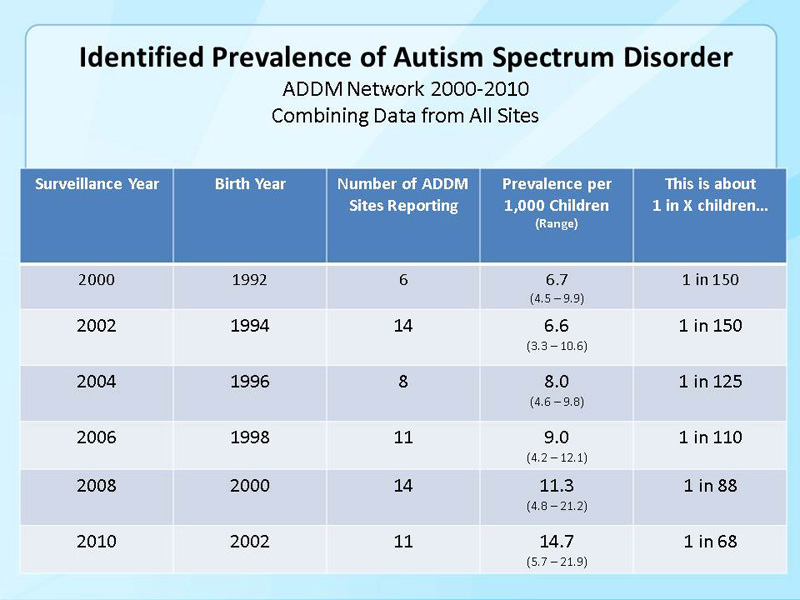Adults With Autism And Intellectual Disability: Increased ADHD Prevalence

Table of Contents
Many adults live with the challenges of autism spectrum disorder (ASD) and intellectual disability (ID), often facing an additional, frequently overlooked hurdle: attention-deficit/hyperactivity disorder (ADHD). The combination of these conditions – Adults with Autism and Intellectual Disability and ADHD – significantly impacts daily life, demanding increased awareness, understanding, and tailored support. This article explores the complexities of this comorbidity, highlighting diagnostic challenges, the impact on daily functioning, and effective intervention strategies.
<h2>The Complex Relationship Between Autism, Intellectual Disability, and ADHD</h2>
Understanding the intricate interplay between autism, intellectual disability, and ADHD requires recognizing the distinct characteristics of each condition. Autism spectrum disorder is a neurodevelopmental condition characterized by persistent deficits in social communication and interaction, and restricted, repetitive patterns of behavior, interests, or activities. Intellectual disability involves significant limitations in both intellectual functioning and adaptive behavior, impacting conceptual, social, and practical skills. Attention-deficit/hyperactivity disorder, on the other hand, is characterized by inattention, hyperactivity, and impulsivity.
The significant overlap in symptoms poses a substantial challenge in accurate diagnosis when multiple conditions are present. Many symptoms are shared across these conditions, making differentiation crucial for effective treatment. Common overlapping symptoms include:
- Difficulties with attention and focus: This manifests as distractibility, difficulty concentrating on tasks, and problems with sustained attention.
- Impulsivity and hyperactivity (in some cases): While not always present in individuals with autism or intellectual disability, hyperactivity and impulsivity can significantly complicate the picture when co-occurring with ADHD.
- Challenges with executive function: This includes difficulties with planning, organization, time management, and working memory – skills essential for daily living.
- Social communication difficulties: While a core feature of autism, social communication difficulties can also be present in ADHD, albeit often expressed differently.
- Sensory sensitivities: Sensory over- or under-sensitivity is common in both autism and can sometimes be associated with ADHD.
Differential diagnosis is paramount to avoid misdiagnosis and ensure the appropriate intervention plan is implemented. A thorough assessment involving multiple professionals is often necessary to achieve an accurate diagnosis.
<h2>Prevalence and Diagnostic Challenges in Adults</h2>
Research indicates a significantly increased prevalence of ADHD in adults already diagnosed with autism and intellectual disability. While precise comorbidity rates vary across studies due to differing diagnostic criteria and methodologies, the evidence strongly suggests a considerable overlap. However, adult diagnosis presents unique challenges:
- Difficulties in self-reporting: Communication impairments frequently associated with autism and intellectual disability can hinder accurate self-reporting of symptoms, a cornerstone of ADHD assessment.
- Symptom overlap: The overlapping symptoms make distinguishing between the contributions of each condition challenging.
- Limited access to specialized diagnostic services: Access to professionals experienced in diagnosing comorbid conditions in adults can be limited, leading to delays in diagnosis and appropriate intervention.
Several factors contribute to underdiagnosis in this population:
- Lack of awareness among healthcare professionals: Many healthcare professionals may not be fully aware of the high prevalence of ADHD in this population.
- Limited screening tools: Standardized screening tools specifically designed for adults with autism and intellectual disability are often lacking.
- Historical focus on childhood diagnosis: ADHD has historically been focused on childhood diagnosis, leaving a gap in the understanding and assessment of ADHD in adulthood.
<h2>Impact on Daily Functioning and Quality of Life</h2>
The combined effects of autism, intellectual disability, and ADHD significantly impact daily functioning and overall quality of life. Challenges can arise in various areas:
- Employment: Difficulties with attention, organization, and social interaction can hinder employment prospects and job retention.
- Independent living: Managing daily tasks, finances, and personal care can be significantly more challenging.
- Social relationships: Social communication difficulties, impulsivity, and difficulty with emotional regulation can strain relationships with family and friends.
- Mental health: The cumulative stress of managing multiple conditions can increase the risk of anxiety, depression, and other mental health issues.
The effects on daily life are substantial:
- Increased difficulty managing daily tasks: Simple tasks can become overwhelming, requiring significant effort and support.
- Higher risk of behavioral challenges: Frustration and difficulties in self-regulation can lead to increased behavioral problems.
- Increased stress and anxiety levels: The constant challenges associated with managing multiple conditions can lead to high levels of stress and anxiety.
- Impact on relationships with family and friends: The difficulties experienced can strain relationships, leading to isolation and social difficulties.
<h2>Effective Interventions and Support Strategies</h2>
Managing ADHD symptoms in adults with autism and intellectual disability requires a multifaceted approach. Evidence-based interventions include:
- Behavioral therapy: Techniques such as cognitive behavioral therapy (CBT) and applied behavior analysis (ABA) can help individuals develop coping mechanisms and improve self-regulation skills.
- Medication management: While medication can be beneficial for some individuals, careful consideration is necessary due to potential interactions with other medications and the specific challenges of this population. Close monitoring and collaboration between psychiatrists and other professionals are crucial.
- Occupational therapy: Occupational therapy can help individuals develop strategies to improve daily living skills, such as organization, time management, and task completion.
- Social skills training: Social skills training can help individuals improve their social interaction and communication skills.
A multidisciplinary approach is essential, involving professionals from various fields such as psychiatry, psychology, occupational therapy, and speech-language pathology. Personalized treatment plans, tailored to the individual's unique needs and strengths, are crucial for maximizing outcomes.
<h2>Understanding and Supporting Adults with Autism, Intellectual Disability, and ADHD</h2>
In conclusion, the high prevalence of ADHD in adults with autism and intellectual disability highlights the significant impact of this comorbidity on daily life. The challenges in diagnosis and the need for early intervention cannot be overstated. Increased awareness among healthcare professionals and the public is crucial to ensure appropriate screening, diagnosis, and support. Understanding the complexities of Adults with Autism and Intellectual Disability and ADHD is crucial for providing effective support. Learn more about diagnosis and treatment options to help improve the lives of those affected. Seeking professional help for assessment and tailored support is vital for individuals facing these co-occurring conditions. Early intervention and a comprehensive, multidisciplinary approach are key to improving the quality of life for adults with Autism, Intellectual Disability, and ADHD.

Featured Posts
-
 Exclusive Trump To Mandate List Of All Sanctuary Cities And States
Apr 29, 2025
Exclusive Trump To Mandate List Of All Sanctuary Cities And States
Apr 29, 2025 -
 Capital Summertime Ball 2025 A Guide To Ticket Acquisition
Apr 29, 2025
Capital Summertime Ball 2025 A Guide To Ticket Acquisition
Apr 29, 2025 -
 Austins Top News Story A Willie Nelson Documentary
Apr 29, 2025
Austins Top News Story A Willie Nelson Documentary
Apr 29, 2025 -
 How You Tube Caters To The Needs Of Older Viewers
Apr 29, 2025
How You Tube Caters To The Needs Of Older Viewers
Apr 29, 2025 -
 Israeli Airstrike Shakes Southern Beirut Evacuation Warning Issued
Apr 29, 2025
Israeli Airstrike Shakes Southern Beirut Evacuation Warning Issued
Apr 29, 2025
Latest Posts
-
 Iz Za Tepla V Chelyabinske Zakryty Vse Gorki
Apr 30, 2025
Iz Za Tepla V Chelyabinske Zakryty Vse Gorki
Apr 30, 2025 -
 Biker Hospitalized After Serious Accident Involving A Lorry
Apr 30, 2025
Biker Hospitalized After Serious Accident Involving A Lorry
Apr 30, 2025 -
 Doubt Cast On Gretna Mega Development By Nebraska Lawmakers
Apr 30, 2025
Doubt Cast On Gretna Mega Development By Nebraska Lawmakers
Apr 30, 2025 -
 Silnoe Poteplenie Gorki Chelyabinska Ne Rabotayut
Apr 30, 2025
Silnoe Poteplenie Gorki Chelyabinska Ne Rabotayut
Apr 30, 2025 -
 Motorcyclist Suffers Severe Injuries In Collision With Heavy Goods Vehicle
Apr 30, 2025
Motorcyclist Suffers Severe Injuries In Collision With Heavy Goods Vehicle
Apr 30, 2025
